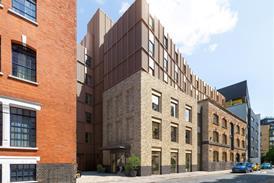- Home
 Heatherwick unveils designs for first residential project in South Korea
Heatherwick unveils designs for first residential project in South Korea Architecture practices monitoring Middle East teams as Iran conflict escalates
Architecture practices monitoring Middle East teams as Iran conflict escalates Green light for Ackroyd Lowrie’s co-living redesign of SPPARC office scheme in Bermondsey
Green light for Ackroyd Lowrie’s co-living redesign of SPPARC office scheme in Bermondsey Reuse of historic buildings dominates 2026 RIAS Awards shortlist
Reuse of historic buildings dominates 2026 RIAS Awards shortlist
- Intelligence for Architects
- Subscribe
- Jobs
- Events

Events calendar Explore now 
Keep up to date
Find out more
- Programmes
- CPD
- More from navigation items
Londoners need more say over new towers, Historic England chief says

Duncan Wilson calls for beefed-up capital-wide approach to protecting built heritage
London needs a more coordinated approach to regulating high-rise development to give residents greater input and ensure the capital’s architectural treasures and views are not lost forever, the chief executive of Historic England has said.
Duncan Wilson acknowledged proposals from the City of London Corporation to introduce more prescriptive rules about acceptable locations for high-rise development and wider use of three-dimensional modelling as part of the planning process.
But the boss of the government’s heritage-advisory body said those plans did not go far enough and that a “pan-London” approach to prevent further harm to the capital’s skyline was required.
…
This content is available to registered users | Already registered?Login here
You are not currently logged in.
To continue reading this story, sign up for free guest access
Existing Subscriber? LOGIN
REGISTER for free access on selected stories and sign up for email alerts. You get:
- Up to the minute architecture news from around the UK
- Breaking, daily and weekly e-newsletters
Subscribe to Building Design and you will benefit from:

- Unlimited news
- Reviews of the latest buildings from all corners of the world
- Technical studies
- Full access to all our online archives
- PLUS you will receive a digital copy of WA100 worth over £45
Subscribe now for unlimited access.


